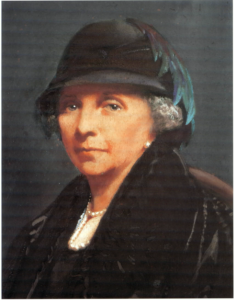Pauline Revere Thayer: A Descendant’s Role in Shaping Paul Revere’s Legacy

Pauline Revere Thayer
Over the years, many women have played a role in shaping how we remember Paul Revere. Perhaps no woman has had more of an impact than Revere’s great-granddaughter, Pauline Revere Thayer (1862-1934). Pauline, the second child of Paul Joseph and Lucretia Lunt Revere, was born while her father and uncle were actively engaged in the Civil War as officers in the 20th Massachusetts Regiment, generally referred to as the Harvard Regiment. Paul Joseph met his new daughter shortly after her birth while on a brief leave, and then was with his family again at least two additional times as he recovered from war wounds and illness. Still, each time he returned to his regiment.
Sadly, at only 16 months old, Pauline and her 3½-year-old brother Frank lost their father to that devastating conflict. Colonel Paul Joseph Revere was wounded on July 2, 1863, during the Battle of Gettysburg. Due to the severity of his wounds, he was moved to the 2nd Corp Hospital in Westminster, Maryland. He was able to muster a short telegram home, which would be his last communication: “Am badly wounded at Westminster, come quickly.” He died on July 4th before his family could arrive.
Though only a toddler, this loss and the earlier loss of her uncle, Edward HR Revere, a military surgeon who was killed at Antietam on September 9, 1862, had a profound impact on Pauline’s life. Like most military widows, her mother Lucretia applied for and was granted Paul Joseph’s pension. Her elderly grandfather Joseph Warren Revere continued to run the Revere Copper Company, but now with the help of his only surviving son, John. The extended Revere family embraced Pauline, Frank and their mother. Life, of course, found a way to go on.
Pauline’s first extensive introduction to the significance of her family’s Civil War sacrifice likely came from A Memorial of Paul Joseph and Edward HR Revere, published in 1874 by her uncle, William Parsons Lunt. The Memorial is a memoir, based on Pauline’s grandmother Mary’s journal about the lives of her sons Edward HR and Paul Joseph Revere. It includes long sections on the Civil War supported by transcriptions of their poignant letters home.
The circumstances of Pauline’s youth and early-adult life are not well-known, but one can comfortably assume that she received a very good education and watched the trajectory of the Revere Copper Company as it transitioned from a family-owned business to a larger corporation wherein the family’s role was diminished after a series of mergers and acquisitions.
As a member of a prominent Boston family, Pauline married well in 1887 when she chose Nathaniel Thayer. Thayer was a wealthy widower and businessman raising three young daughters. By all accounts, though Pauline had no children of her own, she developed a warm relationship with her stepdaughters.
In her adult life, Pauline was very active in the Boston social and philanthropic scene as well as those in Newport, New York, and Lancaster, Massachusetts, where she settled with her husband. She was a co-founder of the Chilton Club, joined the Colonial Dames, and supported the work of the Massachusetts General Hospital. She also believed deeply in the importance of care for veterans and served for a long period as the head of Immigration and Americanization at the Massachusetts Department of Education. Fresh on the heels of the 19th Amendment’s ratification, she was a delegate to the 1924 Republican National Convention where Calvin Coolidge won the nomination.
Though these activities elevated her own profile, her interest in the Revere family legacy never waned. In fact, Pauline was a key figure in the restoration of the Revere House at 19 North Square. Late in 1902, John Phillips Reynolds, her cousin and great-grandson of Paul Revere, purchased the building for $12,000, thereby delaying a plan to tear it down and replace it with a tenement apartment. For the next six years, both cousins played key roles in ensuring the restoration of the home. They worked diligently to rally family members, preservationists, city officials, and others to raise the $30,000 needed to reimburse Reynolds for his purchase, accomplish the restoration of the house, and create the organization that runs the property to this day, the Paul Revere Memorial Association. Pauline was the only woman to sign the 1907 incorporation papers and she served on the Executive Committee from 1908-1934. Given her interest in improving the lot of immigrants to America, it is not surprising that one of the Association’s goals in restoring the Paul Revere House was the hope that it would serve as “a constant incentive to patriotic citizenship and the study of our national history.”
When the Revere House opened as a museum in 1908, Mrs. Thayer was not done working on her family legacy. Using Revere’s own shop records, she amassed the premier collection of Revere silver, over 100 pieces. The silver collection and other family-owned items were loaned and then eventually gifted to the Museum of Fine Arts in Boston. Though she had means, even at this early date, collecting Revere silver was not without its substantial costs.
In 1913, she republished A Memorial of Paul Joseph and Edward HR Revere, the book that had undoubtedly been both an inspiration in her youth and for her works as an adult to preserve the family’s ancient house. In the republication, Pauline shared her reasons for caring so deeply about the family legacy:
“To the younger generation,
I have had this book reprinted and the pictures added, with the hope that it may keep alive in the minds and hearts of you all the knowledge of what the war meant, and what our fathers and your grandfathers and great uncles did for their country fifty years ago.”
Though it seems that the book was not widely distributed or read, by saving her great grandfather’s legacy through his home and his silver, she essentially also saved the story of her father and uncle. Pauline died in 1934 and was buried along side her husband in Lancaster. With this we are reminded that the Revere story is indeed one of courage, loss, patriotism, and pride, but mostly it is a story about family and memory.
Nina Zannieri is the Executive Director of the Paul Revere House.




